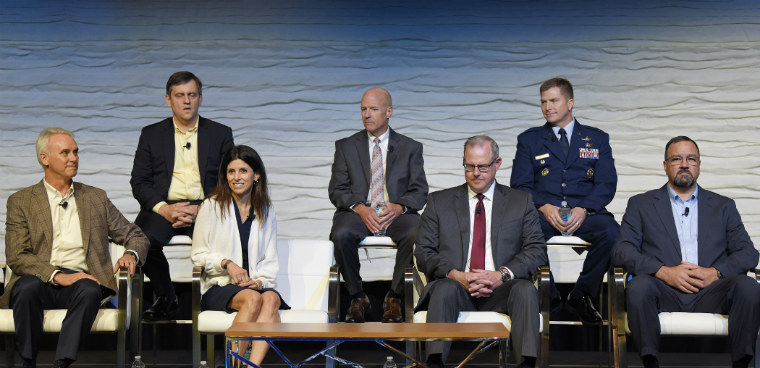CIA looks to hang up the fax
The spy outfit is beta testing a plan to exchange emails with contractors, the agency CIO said.

Juliane Gallina (third from left) joins a panel of intelligence community CIOs at a conference in August, 2019. (Photo credit: David Richards/Defense Intelligence Agency)
The CIA is looking to hang up the fax machine and communicate with vendors via email, under a program dubbed Gray Magic, the spy agency's CIO said Oct. 2.
"If you do work with the CIA, you should already have applied for an account with Gray Magic" to communicate with the agency about IT acquisition and innovation, Juliane Gallina said at a FedScoop event.
The program is currently in beta, she said, but it is meant to replace the secure fax machines the agency currently uses to interact with industry with a dedicated email connection.
"It's a new secure network designed specifically to allow industry partners to have their own direct communications and collaboration with government to help us facilitate acquisition," she said.
Gallina has been on the job since April 1, after returning to government service from leading key accounts at IBM US Federal. At IBM Gallina specialized in cloud computing, artificial intelligence and analytics, according to a company bio.
The CIA famously adopted a version of Amazon Web Services cloud as the result of a 2013 acquisition move, and just this past April, the agency announced plans to lead the intelligence community in a second wave of cloud acquisitions designed to onboard software-as-a-service capabilities.
Gallina said she and her team have been looking at many of the agency's major IT contracts with an eye to make them more efficient moving ahead.
"Almost all of our major IT contracts are being turned over the next 20-24 months," she said. For the most part, the contracts were mostly traditionally written, with long, 10-year time lines, according to Gallina, which tends to make them inflexible and slow in the dynamic, evolving tech arena.
"We're seeing innovation today come from industry in many of the cloud-based tools" coming online, she said. "Our ability to sense the network and networked environment has been completely transformed, as the CIA has moved solidly into the cloud era," she said.
The approach, she said, puts technologists in the center of innovative tech contracting instead of pressing contracting officers to become the innovators.
NEXT STORY: FCW Insider: Oct. 2





